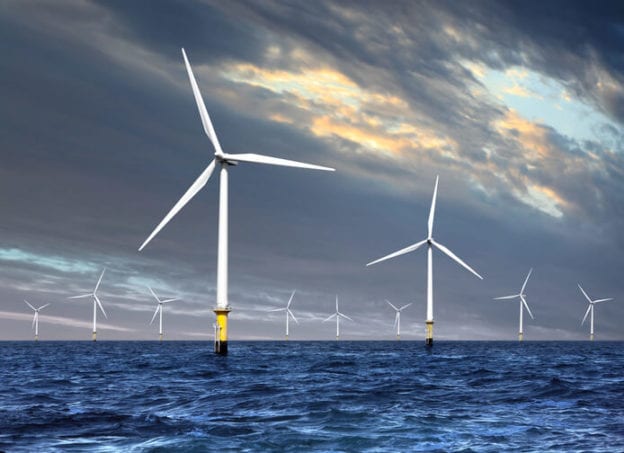‘Largest’ Floating Offshore Wind Farm Comes Online in North Sea
Credit to Author: Darrell Proctor| Date: Tue, 15 Nov 2022 17:39:15 +0000

An installation that at present is considered the world’s largest floating offshore wind farm has produced its first power, providing electricity for oil and gas exploration operations in the North Sea.
Hywind Tampen on Nov. 13 began powering Equinor’s drilling at the Gullfaks oil and gas field. The wind farm is located about 87 miles off the coast of Norway, in water with depths ranging from 260 meters to 300 meters.
Norway has been a leader in driving the development of offshore wind power installations in the North Sea.
The turbine entering service Sunday is the first of seven expected to come online by the end of this year. Four more turbines are scheduled to begin operating next year. Equinor has said the wind farm when fully operational will have 88 MW of generation capacity.
“I am proud that we have now started production at Hywind Tampen, Norway’s first and the world’s largest floating wind farm,” Geir Tungesvik, Equinor’s executive vice president for projects, drilling and procurement, said in a statement. “This is a unique project, the first wind farm in the world powering producing oil and gas installations.”
Other companies involved in the Hywind Tampen project include Vår Energi, INPEX Idemitsu, Petoro, Wintershall Dea, and OMV.
Powering Oil and Gas Sector
The Hywind Tampen installation is among several offshore wind farms being developed to power oil and gas offshore drilling. General Electric (GE) has announced it could deploy 1.5 GW of offshore wind to support decarbonization of oil and gas production in the Gulf of Suez, as part of an alliance with Egyptian fossil-fuel group EGAS.
GE signed the agreement at the ongoing COP27 climate summit in Sharm El Sheikh, Egypt. Seasplit, an offshore renewable energy engineering group, also will participate in the deal, with the three groups cooperating over the “technical and economic feasibility” of the project.
Hussein Mesharafa, CEO of Seasplit, in a statement said, “Egypt has tremendous offshore wind resources. Our data analysis shows that the Gulf of Suez can reach up to 10GW of wind capacity. This ambitious, visionary announcement sets the path towards leveraging these resources to eventually transform the Gulf of Suez to a net-zero industrial zone … [and] is expected to create new localization, supply chain, and employment opportunities.”
Joseph Anis, CEO of GE Gas Power EMEA, said, “This initiative has the potential to establish Egypt as a regional hub and exporter of renewable power and can set new benchmarks in the delivery of clean energy to drive industrial operations.” The partners said excess power from offshore wind could be sent to the onshore grid.
Siemens Gamesa Turbines
Equinor has said the Hywind Tampen wind farm is expected to supply about 35% of the electricity demand from the Gullfaks and nearby Snorre oil and gas fields. The company in a statement said the use of wind power “will cut CO2 emissions from the fields by about 200,000 tonnes per year.”
The 11, 8-MW Siemens Gamesa turbines at Hywind Tampen are installed on a floating concrete structure, with a joint mooring system. Floating wind turbines enable installation in deeper waters, as compared to fixed-bottom turbines. Equinor in 2017 began operating Hywind Scotland, a 30-MW floating wind farm with five turbines, a project which is considered the world’s first floating wind farm.
Several other floating wind farm projects have either entered service in the past five years, or are in development. The Biden administration earlier this year said it wanted at least 15 GW of floating offshore wind capacity installed off the U.S. coast by 2035. The administration’s “Floating Offshore Wind Shot” aims to reduce the costs of floating offshore wind technologies by more than 70% over the next decade-plus.
“Bringing floating offshore wind technology to scale will unlock new opportunities for offshore wind power off the coasts of California and Oregon, in the Gulf of Maine, and beyond,” the White House said in a statement in September announcing the program. Officials from the U.S. Interior Department in October announced the first-ever sale of development rights for installations off the California coast.
Global Development
Japan’s Kansai Electric Power and RWE Renewables last year announced a deal to assess the feasibility of what they called a “large-scale floating offshore wind project” off the coast of Japan. RWE is developing several projects worldwide, including the Sofia Offshore Wind Farm, a planned 1.4-GW installation in the Dogger Bank area of the North Sea that the company said “is the largest offshore wind project in RWE’s current portfolio.”
Australia has announced plans for at least three largest offshore wind power developments, with interest from Equinor and others including Shell and Orsted. Victoria state is leading Australia’s push for offshore wind, with a target of 4 GW of capacity by 2035, and 9 GW by 2040. The 2.2-GW Star of the South project, majority owned by Denmark-based Copenhagen Infrastructure Partners and in development for the past decade, is now expected to come online in 2028, according to state officials.
—Darrell Proctor is a senior associate editor for POWER (@POWERmagazine).
The post ‘Largest’ Floating Offshore Wind Farm Comes Online in North Sea appeared first on POWER Magazine.